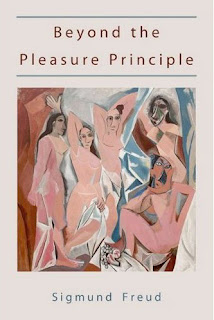A QUESTION which seems natural and almost unavoidable arises:
What can one say about A book, and a little one at that, which is forty years old,
and which is supposedly not one of the most impressive or "spectacular"
Bits of Freud's Many writings? The Question presupposes the implied answer that
forty years even in our swift-moving world is a long time, that the book in question
is therefore more or less superannuated and deserves but a respectful historical
glance before we put it back on the shelf to gather more dust. It Is obvious that
the above is a rhetorical way of saying that forty years after its appearance and
twenty years after Freud's death, Beyond The Pleasure Principle Still deserves considerable
attention, and that the reader would do well if he reads it with studious curiosity.
Of Recent years we have become so accustomed to the atmosphere of controversy which
surrounds psychoanalysis and Freud That we have al- most lost our capacity to pick
up a book on psychoanalysis without wanting to know in advance whether the book
is for or against it, or, if it is for it, whether it is for Freud Or for Jung,
or, if it is Freudian, Whether it is orthodox or neo-Freudian. If We dared to be
frank with ourselves, we would have no difficulty in admitting that our judgment
of psycho- analysis is actually fragmentary and not too profound. We Could also
admit that some sort of partisanship possesses us, and that therefore we are preoccupied
with "taking sides" long before we get acquainted with the very first
elements of psychoanalysis and the many-sidedness of the subject. It Is because
of the various prejudices which have incul- cated themselves into psychoanalytical
and nonpsychoanalyti- cal circles that it is pertinent to invite
both the initiated and the uninitiated
reader to suspend his fragmentary judgment
BEYOND
THE PLEASURE PRINCIPLE For a short while and re-read afresh the little ,book, that
is here, offered, and acquaint or re-acquaint, himself ,with ,the ,sound ,of ,Freud's
Written voice, with ,his way of saying ,things, ,and then ,with, the substance,
of ,what he ,has, to ,say. ,An Introduction ,is, not ,supposed ,to explain ,in advance,
what is said in the book; still less is it meant to interpret it. Rather, It is
intended to clarify some shadows and point to certain lights which will possibly
set the book in a proper perspective. Bearing This in mind, let us first recall
that Freud Wrote Beyond The Pleasure Principle When he was sixty-four years old
a mature age indeed and at a time when psychoanalysis had already achieved considerable
popularity, even though it was still possible to assess the degree of its importance
by the number of enemies it had. The Tone of the book, the manner- isms of its style
are vigorous, poignant, almost controversial; Freud It seems was still combating
his opponents rather than trying to instruct his proponents. Almost To the last
years ,of his life, Freud Preserved this combative vigor ,of ,writing, ,and ,in
,Beyond The ,Pleasure Principle This aspect ,of ,style stands out markedly, particularly
when he emphasizes his claim that he is a partisan of no special philosophy and
that he is indif- ferent as to whether what he has to say does or does not fit any
known philosophy...
DOWNLOAD BOOK : http://adf.ly/1d8bYH



0 Commentaires